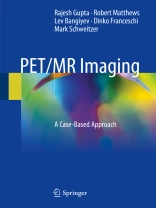This book offers an overview of the clinical applications of PET/MR imaging through a case-based format. Hybrid PET/MRI provides functional and anatomical information via one setting offering superior imaging quality with lower radiation dose being administered to the patient. The cases in this book focus on the use of this technique in the diagnosis of oncologic, neurologic, cardiovascular, infectious and inflammatory, and pediatric diseases. Each case is presented with the patient history, protocols, interpretation of findings, and pearls and pitfalls accompanied by high quality PET/MR images. The major strength of this book is the discussion of both MRI and PET findings pertinent to each particular case. It expands the discussion of oncologic applications of this modality through a variety of cases that highlight staging, treatment response, and follow up. Illustrating a spectrum of PET/MRI clinical applications, PET/MR Imaging: A Case-Based Approach is a valuable resourcefor radiologists, nuclear medicine physicians, and residents.
Cuprins
Recurrent High-Grade Sarcoma.- Bone Metastases from Lung Cancer.- Benign Notochordal Cell Tumor.- Ewing Sarcoma.- Multiple Myeloma.- Osteomyelitis.- Malignant Soft Tissue Myxofibrosarcoma.- Vertebral Body Hemangioma.- Therapy-induced Marrow Changes.- Benign Spinal Cord Compression.- Prostate Cancer Metastases Detected on Na F PET/MRI.- Tarlov Cyst.- Cellulitis.- Degenerative Spine: Modic Type I Changes.- Extramedullary Multiple Myeloma.- Aortitis.- Primary Bone Lymphoma.- Radiation Effect on Bone Marrow.- Recurrent Myxoid Liposarcoma.- Osseous Sarcoidosis.- Osteoblastic Metastasis from Breast Cancer.- Osteoblastic Metastasis from Breast Cancer.- Acute Benign Vertebral Compression Fracture.- Spinal Neuropathic Arthropathy.- Well-differentiated Liposarcoma.- Pulmonary Sarcoidosis.- Cardiac Metastasis from Renal Cell Carcinoma.- Breast Cancer (Invasive Ductal Carcinoma).- Benign Thymic Rebound Hyperplasia.- Pulmonary Infarct.- Mediastinal Lymphoma.- Inflammatory Breast Cancer
.- Benign Loculated Pleural Effusion .- Chest Wall Metastasis from Renal Cell Carcinoma.- Non-Small Cell Lung Cancer.- Cardiac Sarcoidosis.- Internal Mammary Lymph Node Metastasis from Breast Cancer.- Lung Metastases.- Pleural Metastases from Invasive Thymoma.- Thoracic Aortic Aneurysm.- Mediastinal Sarcoidosis.- Metastatic Breast Cancer to the Liver.- Multifocal Pneumonia.- Invasive Lobular Breast Cancer.- Hodgkin’s Lymphoma of the Lung
.- Liver Metastases from Colon Cancer.- Esophageal Adenocarcinoma.- Focal Colonic Activity.- Diffuse Fatty Liver.- Pancreatic Ductal Adenocarcinoma.- Diffuse Splenic Uptake.- Simple Hepatic Cyst and Hemorrhagic Hepatic Cyst.- Carcinoid Tumor with Gallium.- Large Gallstone and Sludge.- Cecal Cancer with Lymph Node Involvement.- Hepatocellular Cancer with No FDG Uptake.- Diffuse FDG Uptake in the Bowel Secondary to Metformin Use.- Splenic Hemangioma.- Invasive Anal Cancer.- Liver Iron Deposition.- Peritoneal Metastases from Colon Cancer.- Malignant Gallbladder Polyp.- Diverticulitis.- Splenic Lymphoma.- Gastric Adenocarcinoma with Lymph Node Metastasis.- Rectal Cancer.- Hepatocellular Carcinoma FDG Positive.- Metastatic Pancreatic Insulinoma Detected with Gallium.- Focal Nodular Hyperplasia.- Acute Enteritis.- Pancreatic Head Cancer.- GIST Hemorrhagic Metastases.- Recurrent Colon Cancer.- Neuroendocrine Tumor Gallbladder.- Hepatic Chemoembolization Resulting in Chemical Cholecystitis.- Cervical Cancer with Lymph Node Metastases.- Simple Renal Cysts.- Mature Cystic Ovarian Teratoma.- Papillary Urothelial Neoplasm of the Bladder, Low Malignant Potential.- Adrenal Adenoma.- Invasive Cancer of the Vulva.- Physiological FDG Uptake in the Uterus and Ovary.- Renal Cell Carcinoma.- Urinoma – Urinary Fistula.- Endometrial Polyps and Tamoxifen-Associated Changes.- Prostate Cancer.- Colovaginal Fistula.- Seromas – Post-operative.- Uterine Leiomyomas.- Invasive Small Cell Bladder Cancer.- Bladder Cancer Causing Hydronephrosis in Patient with Duplicated Collecting System.- Endometrial Cancer.- Orbital Rhabdomyosarcoma.- Chronic Thyroiditis.- Base of the Tongue Squamous Cell Carcinoma.- Brown Adipose Tissue
.- Squamous Cell Carcinoma of the Maxilla.- Physiological FDG Uptake in Tonsils.- Recurrent Laryngeal Cancer.- Benign Sinus Disease.- Recurrent Soft Palate Oropharyngeal Cancer.- Recurrent Salivary Gland Cancer.- Tonsillar Squamous Cell Carcinoma.- Benign Thyroid Adenoma.- Retropharyngeal Cancer.- Supraglottic Laryngeal Cancer.- Recurrent Rhabdomyosarcoma of the Infratemporal Fossa.- Warthin Tumor.- Squamous Cell Carcinoma of the Scalp.- Orbital Sarcoidosis.- High-Grade Glioma.- Alzheimer’s Disease.- Pituitary Adenoma.- Oligodendroglioma.- Vascular Dementia.- Tumor Progression.- Meningioma.- Mesial Temporal Lobe Sclerosis.- Brain Abscess.- Glioblastoma Recurrence with Negative FDG PET.- Logopenic Primary Progressive Aphasia.- Crossed Cerebellar Diaschisis.- Amyloid Plaques in Alzheimer’s Disease.- Posterior Cortical Atrophy.- Primary CNS Lymphoma.- Creutzfeldt-Jakob Disease.- Calvarial Hemangioma.- Dementia with Lewy Body.- Cerebral Amyloid Angiopathy with Alzheimer’s Disease.- Dural Metasta Dural Metastasesses.- Frontotemporal Dementia.- Neurosarcoidosis.- Tumor Pseudoprogression.- Semantic Dementia.- Normal Pressure Hydrocephalus.- Brain Metastases.
Despre autor
Rajesh Gupta, MD
Stony Brook University Hospital
Department of Radiology
Stony Brook, NY, USA
Robert Matthews, MD
Stony Brook University Hospital
Department of Radiology
Stony Brook, NY, USA
Lev Bangiyev, DO Stony Brook University Hospital
Department of Radiology
Stony Brook, NY, USA
Dinko Franceschi, MD
Stony Brook University Hospital
Department of Radiology
Stony Brook, NY, USA
Mark Schweitzer, MD
Stony Brook University Hospital
Department of Radiology Stony Brook, NY, USA












